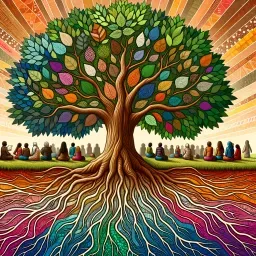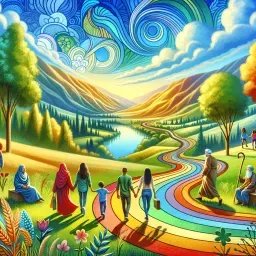”Some travel to lose themselves,
some travel to find themselves“

0
0
0
0
- Meaning
- The meaning of this phrase lies in the duality of the travel experience. On one hand, there are those who embark on a journey to escape from their own lives, routines, and problems, seeking a form of evasion. On the other hand, there are people who travel in the hope of discovering themselves, growing, and finding a new purpose or a new identity. This invites us to reflect on how different approaches to travel can influence individuals’ lives and worldviews.
- Allegory
- In the proposed allegorical image, the winding path represents the complexity of life's journey. The figures in the foreground symbolize different attitudes towards travel: the serene person expresses inner search and discovery, while the anxious one represents those who are trapped by worries and fears of the past. The setting sun, finally, is a symbol of hope and new beginnings, suggesting that every journey, whether to lose oneself or to find oneself, is endowed with meaning and opportunity.
- Applicability
- The meaning of this phrase can be applied to one's everyday life experiences: when faced with important decisions or challenges, we can ask ourselves whether we are seeking to escape or to discover new aspects of ourselves. Therefore, it can become an invitation to undertake journeys, whether physical or metaphorical, with awareness.
- Impact
- This phrase has had a significant impact on travel culture, encouraging people to reflect on the motives and desires that drive them to embark on journeys. It is often cited in motivational contexts, where the psychology of travel is examined. It underlies many travel narratives and stories of personal growth.
- Historical Context
- There is no specified date of origin for this phrase. However, it is situated in a historical and cultural context in which travel has always been seen as an opportunity for personal growth and exploration of the unknown. Throughout history, travel has represented a form of liberation and discovery.
- Criticisms
- No particular criticisms related to this phrase have emerged. However, some people might interpret it differently, suggesting that one can also travel without a fundamental purpose or direction, which might lead to less enriching experiences.
- Variations
- There are variations of this phrase in different cultures that emphasize travel as a means for the philosophy of living, such as in the Buddhist concept of "Moving through the world," which explores one's life both as a journey in itself and as continuous change. Variations in interpretation can deviate from the original meaning, embracing various individual experiences.
-

You cannot reach the dawn without passing through the paths of the night.
-

I am part of all that I have found on my path.
-

Always choose the path that seems the best, even if it appears the most difficult: habit will soon make it enjoyable.
-

Once we accept our limits, we go beyond them.
-

You can build something beautiful even with the stones you find on your path.
-

It is in giving that we receive.
-

If the goal to achieve is happiness, the journey is always worthwhile.
-

I live in that solitude which is painful in youth, but delicious in the years of maturity.
-

You were my new dream.
-

There are paths without travelers. But there are even more travelers who do not have their paths.
-

Reality is merely an illusion, albeit a very persistent one.
No Comments